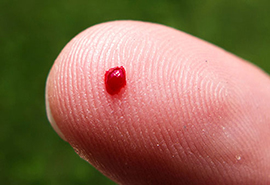


Puncture wounds are injuries caused by sharp objects. There isn't usually a lot of bleeding that occurs with a puncture wound because such wounds seem to close almost instantly. But that doesn't mean that treatment isn't necessary. A puncture wound can result from stepping on a nail or from bites etc, and it can be dangerous because of the risk of infection. These wounds carry dirt and germs deep into the tissues which greatly Increases the risk of infection.
Self-Care at Home